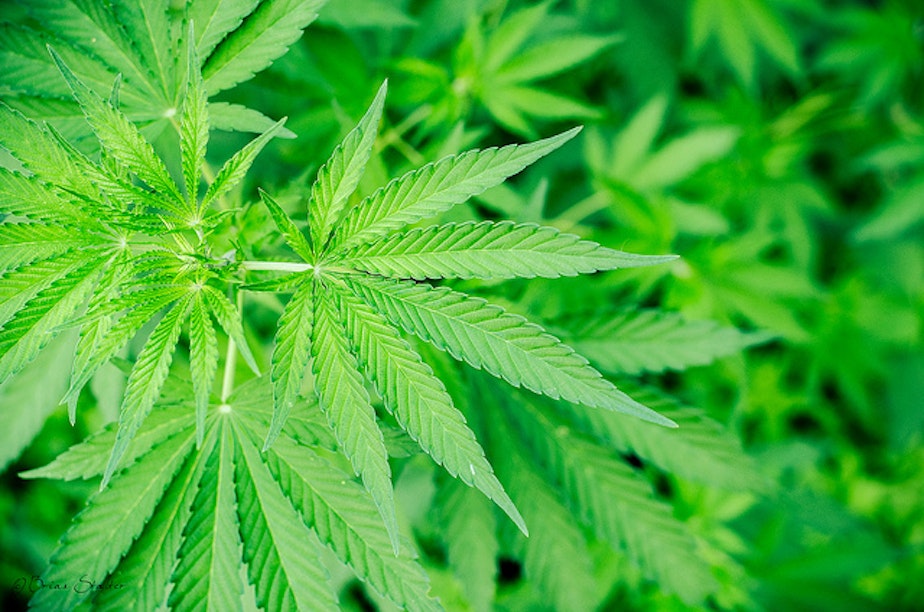Why erasing marijuana convictions could also wipe away 'collateral damage'

Kim Malcolm talks with Alison Holcomb about Seattle's move to vacate convictions for misdemeanor marijuana possession. Holcomb is director of strategy for the ACLU of Washington and the architect of Initiative 502, which legalized recreational marijuana in Washington.
Transcription
Alison Holcomb: I think that when Washington voters passed I-502 back in 2012, it really was a statement that they recognize that treating marijuana use as a crime was not only not working for the purposes it was originally intended, but was also creating a lot of collateral damage and especially when it came to disproportionate enforcement against people of color in our state.
Kim Malcolm: Now this new policy announced this morning by the city it doesn't just drop charges it also vacates convictions. Can you tell us what that means exactly and what impact do you think that's going to have on people?
AH: What this change does is it goes back in time to a period when possession of marijuana was still a crime. And it says that people that were convicted under the law at that time will no longer suffer the ongoing collateral damage of having a misdemeanor conviction on their record.
Sponsored
KM: So it’s going to be completely — completely wiped clean?
AH: That's right. And I think that that's especially important in the context of marijuana possession because it's one area in the criminal justice system where we have stark examples of racially disparate enforcement of the law. And they say that because in Washington State it's always been the case that white people tend to use marijuana at slightly higher rates than their neighbors of color. And yet we see disproportionately that black Washingtonians are arrested, charged, and convicted for marijuana offenses at three times the rate of their white neighbors.
KM: Can you give us a few specific examples of what this is going to change for people in their lives once this happens?
AH: When you go in to apply for a job that you may have to fill out an application that asks whether or not you've ever been convicted of a crime. You may be asked that in an interview. When you go to apply for an apartment, you may be asked the same questions. If you apply for federal financial aid to go to college, you're going to have to reveal whether or not you've ever been charged and convicted of a crime and you can be denied access to jobs, housing, schooling — on the basis of having a conviction for an activity that Washington State voters have subsequently said, ‘Yeah that never should have been a crime in the first place.’
KM: Alison, I'm sure you heard last week the district attorney in San Francisco said that his office was not only going to dismiss thousands of misdemeanor pot charges, but they were also going to think about reducing felony charges — close to 5,000 of them. What do you think of that path?. Do you think Seattle should go further than just looking at the misdemeanors?
Sponsored
AH: I think the challenge is that Seattle doesn't have jurisdiction over felony offenses. We need to talk to Dan Satterberg, our King County prosecutor, about what we could do with respect to felony charges. But from a policy perspective, if we're talking about people that have been charged for growing their own marijuana in the privacy of their home for example, for their own personal use, we are actually the only state out of all of those that have legalized marijuana that still treats that act as a crime. I think we really ought to take a hard look at whether it's right to continue to saddle those people with felony convictions.
KM: Alison, some people listening to us today may be thinking, you know, 'You were convicted before when marijuana possession of it was still illegal. Those were the consequences you faced at that time.' How would you respond to that?
AH: Well I think one of the great things about living in our democracy is that we have the opportunity to realize when we've made mistakes and to correct course. We once had Jim Crow laws that segregated us from the same facilities and we recognize that that wasn't right and we changed it. And in the case of alcohol prohibition we amended the United States Constitution and then turned around and repealed it 13 years later. I think that this is a moment in time where we're starting to recognize we've done a good thing, we're moving in the right direction, but we still need to clean up some of the damage that we caused when the laws were different.


